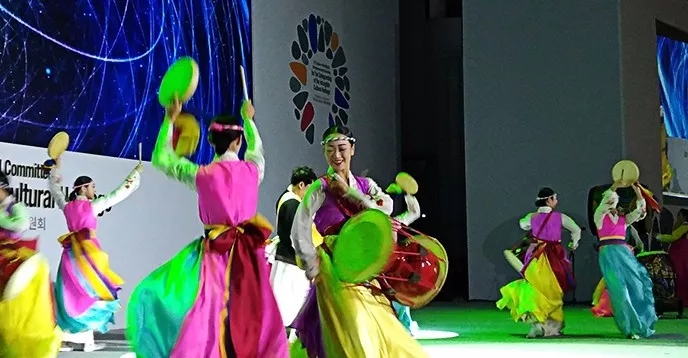The Intergovernmental Committee for the Safeguarding of the Intangible Cultural Heritage opened its 12th session in Jeju

Jeju (Republic of Korea), 03 December—The Intergovernmental Committee for the Safeguarding of the Intangible Cultural Heritage opened its 12th session in Jeju today with a ceremony featuring Korean performances like the traditional Arirang song.
“A great deal has been achieved under the 2003 Convention since its entry into force in 2006. It is important to remember that the life of the Convention is far from being static. On the contrary; this is a Convention that grows continuously, constantly adapting to the changing needs of the international community. And it is thanks to this adaptability that it remains so relevant today”, said Francesco Bandarin, Assistant Director-General for Culture of UNESCO, after recalling that the Convention for the Safeguarding of the Intangible Cultural Heritage has enjoyed the most rapid rate of ratification of any cultural convention, “since we have today 175 States Parties”.
“Intangible cultural heritage is among humanity’s most precious expressions, precisely because it goes to the very heart of how we understand the world, each other and ourselves. […] It is also people-based, it can only be defined and safeguarded by communities that practice it. In line with such a vision, the 2003 Convention is rooted in the understanding of intangible cultural heritage as something living, dynamic and as an ever-changing source of knowledge and something that can be at once traditional and innovative”, said H.E. Byong-hyun Lee, Chairperson of UNESCO’s Executive Board, who also chairs the 12th session of the Intergovernmental Committee for the Safeguarding of the Intangible Cultural Heritage.
“As the 2003 Convention articulates, intangible cultural heritage is a bridge that links between our past and future, and it symbolizes the identity and self-esteem of communities involved”, stressed Kim Jong-Jin, who heads the Cultural Heritage Administration of the Republic of Korea, when recalling the long-term commitment of his country to the 2003 Convention.
During its session, which will end on 9 December, the Committee will examine the periodic reports submitted by 11 States Parties to the Convention regarding legal, regulatory or other measures taken to safeguard intangible cultural heritage in their countries. Other topics to be discussed include intangible cultural heritage in situations of emergency, the impact of the Convention and the allocation of resources from the Intangible Cultural Heritage Fund.
The Committee will consider six nominations for inclusion on the List of Intangible Cultural Heritage in Need of Urgent Safeguarding designed to rally international cooperation and assistance for threatened cultural expressions. Thirty-four nominations for inscription on the Representative List of the Intangible Cultural Heritage of Humanity will also be examined alongside two proposals for the Register of Good Safeguarding Practices and two International Assistance Requests for safeguarding plans or inventories.
Forty-seven elements have been inscribed on the List of Intangible Cultural Heritage in Need of Urgent Safeguarding to date in 26 countries. The Representative List of the Intangible Cultural Heritage of Humanity numbers 365 elements in 108 countries. Seventeen programmes are featured on the Register of Good Safeguarding Practices.
Intangible cultural heritage encompasses practices and living expressions handed down from one generation to another. It includes oral traditions, performing arts, social practices, rituals, festive events, knowledge and practices concerning nature and the universe as well as the knowledge and skills of traditional crafts.
The Intergovernmental Committee for the Safeguarding of the Intangible Cultural Heritage numbers 24 representatives of States Parties to the Convention, elected for a four-year term. It meets once a year.

Address: 81, Laiguangying West Road, Chaoyang District, Beijing, China
Zip Code: 100021
Tel: 86-10-64966526
Fax: 86-10-64969281
E-mail: crihap@crihap.cn
Leave us your e-mail address, we'll let you know about current events.



